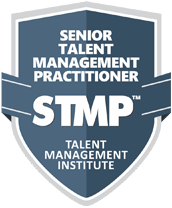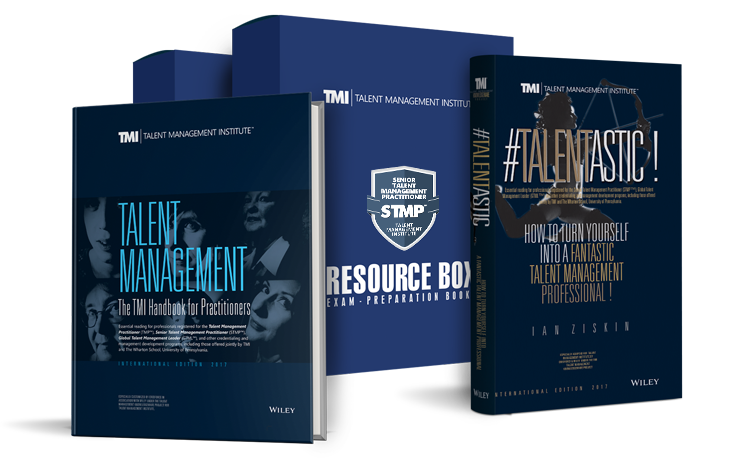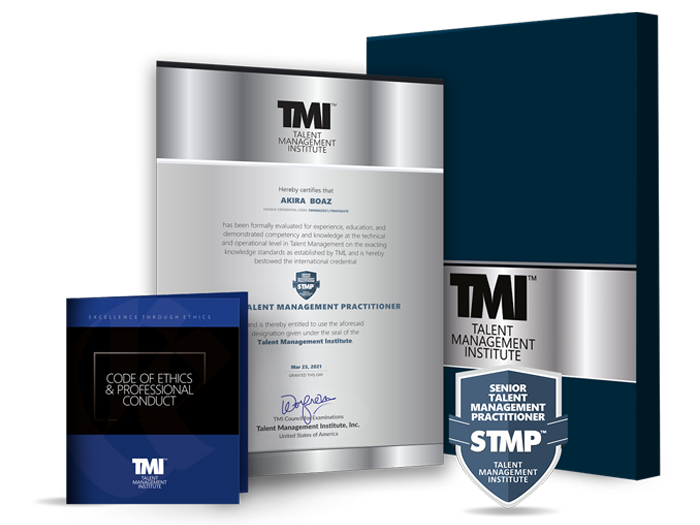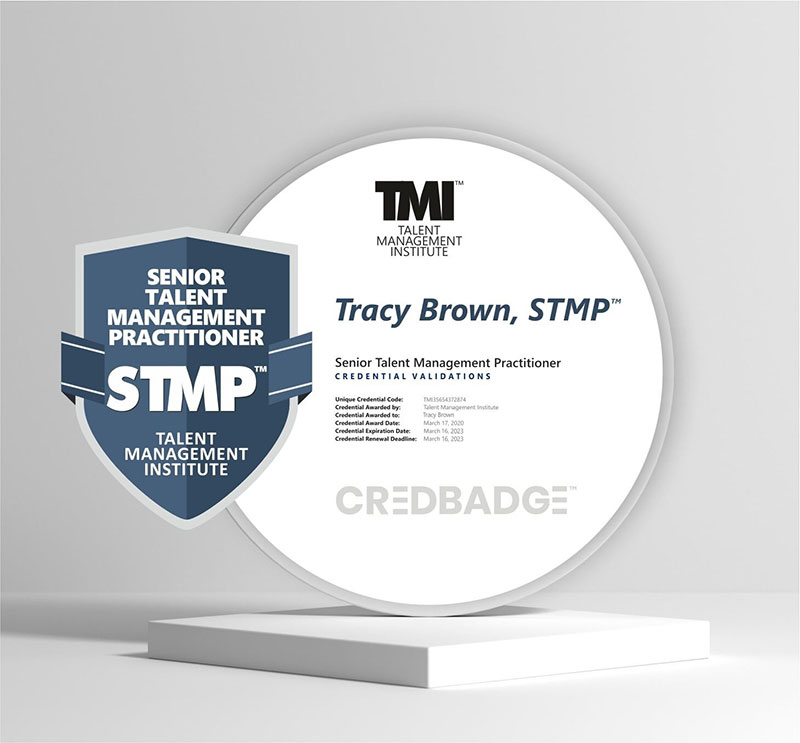The STMP™ credential helps professionals drive themselves through the Talent Management discipline efficiently and effectively. It is robust proof of your competence as an ambitious HR professional. It will help you assure employers of your advanced skills in handling complexities of a changing business landscape, workforce dynamics and HR accountabilities for their business. It’s a qualification that increasingly proves how a Talent Management credential can accelerate career growth.
If you have been in HR for a while, you know exactly what the effects have been of the dramatic paradigm shift away from general HR toward a Talent centered approach. HR professionals and leaders are now searching for new tools, certification and knowledge to help their organization succeed.
A STMP™ certification is just that. It will prepare you for your next step into the future of work. According to a recent study, 100% of the HR professionals today globally perform just 12% of the jobs their predecessors performed just a decade ago. That means as more and more tasks become automated and more functions are either outsourced or distributed, HR roles are becoming more specialized. STMP™ prepares you for excelling into this phenomena by establishing yourself as a leader in Talent Management. It will fully equip you to stand out from your HR peers and highlight your talent for Talent Management.

This one-time fee covers 1 (one) STMP™ certification exam attempt, the TMI Resource Box (the TMI Study Kit), the digital badge, the credential case, and all material shipping costs. This fee does not include special local taxes, duties, levies, etc., which may apply to the receiver’s/ consignee’s/ applicant’s country. Refund requests made within 24 hours of making the payment will be subject to a processing charge of US$ 80. No refunds will be issued for registration cancellation requests made after 24 hours of registration.
*We honor military and veterans with special pricing.
Register NowNote : The fee is subject to change without prior notice and does not include the training fee charged by training companies, universities, or institutions authorized to offer exam preparation training for TMI certification exams. TMI is a standards and credentialing body that does not control the delivery of training or education and does not have the authority to govern or mandate the training/program fee charged for any TMI certification by any training company or education provider.
Become a highly sought-after TALENT MANAGEMENT expert with STMP™.
Earning your STMP™ certification directly pre-qualifies you for the exclusive TMI Associate Fellow Program in Talent Management!!
The Associate Fellow Program in Talent Management is the first opportunity of its kind to learn the state-of-the-art Talent Management thoughts and practices from two global education powerhouses. These programs offer unique insight and direct tutelage from globally renowned faculty. The program is designed to transform participants into impactful leaders of the highest order.
Remember, the TMI Associate Fellow Program in Talent Management is an intensely selective program with thousands of HR professionals from around the world vying for a limited number of seats. If you meet the standard candidacy requirements for the program, your STMP™ credential will earn you an exemption from the applicant screening stage and place you directly into the qualification stage. On top of that, the special TMI alumni fee will also be applicable for you.
Click here to register for STMP™Your registration for the STMP™ certification program provides you with both a comprehensive resource box, delivered to you, and a suite of resources accessible on your myTMI dashboard, designed to support your journey to certification:
Physical Resources (Delivered to Your Home in the STMP™ Resource Box):
Digital Resources (Available on your myTMI Dashboard):
Explore how STMP™ can accelerate your professional growth—Talk to a Program Advisor.

*The images are for representation only.
The following table summarizes the specifics of what it takes to become a STMP™. There are SIX convenient tracks covering HR professionals from diverse backgrounds and experience to earn a STMP™!
Minimum Qualification Required
Should have completed Bachelor's Degree in Human Resource Management/Business/ Management/ Related Disciplines
Minimum Work Experience
7 Years or more experience in any of the HR sub-functions
Minimum Qualification Required
Should have completed Bachelor's Degree in Other disciplines
Minimum Work Experience
8 Years or more experience in any of the HR sub-functions
Minimum Qualification Required
Should have completed Master's Degree/ Master's-level Diploma in Human Resource Management/ Business/ Management/ Related Disciplines
Minimum Work Experience
5 Years or more experience in any of the HR sub–functions
Minimum Qualification Required
Should have completed Master's Degree/ Master's-level Diploma in Other disciplines
Minimum Work Experience
7 Years or more experience in any of the HR sub–functions
Minimum Qualification Required
Current & Past students of Bachelor’s/ Master’s Level professional qualifications in Human Resource Management/ Business/ Management/ Related Disciplines from any of the TMI-recognized institutions
Minimum Work Experience
5 Years or more experience in any of the HR sub–functions
Minimum Qualification Required
Should hold a Bachelor's degree and possess an active credential by CIPD, HRCI, ATD, SHRM & other certification bodies whose credentials TMI may recognize under the QualiFLY™ program.
Minimum Work Experience
5 Years or more experience in any of the HR sub–functions
Click here to Consult a Program Advisor for your STMP™ eligibility details.
There are SIX distinct stages of your journey toward becoming a STMP™. Please see the process below for an overview of each stage.
For more details, login to your myTMI account.
Before you start your STMP™ application, reviewing the eligibility criteria carefully is essential. This step will help you ascertain whether you possess the required qualifications to initiate the registration process. By doing this, you ensure you are eligible and fully equipped to begin your registration for the STMP™ certification registration.
After confirming that you meet the eligibility criteria, the first step in starting the application process is to create your myTMI account here. This account provides access to a streamlined and convenient online application process. You will be prompted to fill out a form in which you must provide accurate and complete details about your highest educational qualification and work experience; this is a crucial step in ensuring your application is successful. Once you have submitted the application form successfully, you will proceed to the fee payment screen. An email will be sent to you to acknowledge your registration and payment completion.
Note:
After you have successfully completed the registration process, the logistics team will contact you at your registered email address to verify your shipping details and contact information. It is crucial to respond promptly to this email so that your Resource Box can be sent out on time.
STMP™ candidates receive the exam preparation material, also known as “Resource Box,” for essential reading to aid them in preparing for their STMP™ certification exam. The Resource Box contains TMI’s flagship publication - The TMI Handbook for Practitioners and #Talentastic! which serve as the essential reading designed to aid candidates in preparing for the STMP™ certification exam.
STMP™ certification exam can be scheduled online from the myTMI dashboard. TMI provides 180 days from the registration completion date for the candidates to earn their STMP™ credential. The candidates are required to prepare and take the exam within this 180-day period.
There is no additional fee for the STMP™ certification exam unless you are scheduling your exam beyond the mandatory 180-day period, retaking the exam, or rescheduling after having missed or canceled your previously scheduled exam. The exam preparation guidelines are available in an e-copy format on your myTMI dashboard. It is strongly advised that you thoroughly familiarize yourself with the exam policies before scheduling the exam; this ensures you can be well-prepared and avoid any problems or confusion during the exam.
When scheduling your examination, it is mandatory that you provide details of two valid, non-expired, government-issued identification documents. Candidates are responsible for scheduling the exam in a timely to secure preferred exam windows. It is advisable to schedule the examination at least 30 days before the expiration of the 180-day period. Read more about exam scheduling here.
If you pass the STMP™ exam and meet the other conditions defined by the TMI Professional Certifications Board, you’re recommended for the award of the STMP™ Credential. Your results will be made available to you through your myTMI dashboard within 10-12 business days from the exam completion date. You will then receive an email requesting you to verify your mailing address for the credential kit that carries the physical certificate, lapel pin, and the TMI code of ethics booklet. After confirming your address, you can expect to receive the credential kit within three to four weeks. You will also receive an email with your digital badge details, allowing you to showcase your achievements on social platforms. Once you have received your STMP™ credential, you will have the privilege to use the designation after your name.
The STMP™ credential is valid for three years. It is important you maintain your certification by renewing it.
Renewal is mandatory to keep your certification current. It is recommended you renew your credential before the Standard credential renewal deadline. By renewing your credential, you show your continuing competence and commitment to the profession. TMI will send you reminder emails for renewal of your credential, wherein you simply have to click the links mentioned in these communications, or log into your myTMI account and register for renewal. To receive email reminders from TMI, please make sure to keep your email address current.
An STMP™ certified candidate can register for GTML™, subject to the fulfilment of the candidacy norms by the credential holder. Such candidates are required to pay the prescribed fee and pass the GTML™ exam in order to be awarded the GTML™ credential.

The TMI Professional Certifications Board (TPCB) mandates that individuals seeking the STMP™ certification will have to take and pass computer–based exams. TMI Exams are computer–based tests timed for 120 minutes and delivered on the state-of-the-art ExamStrong™ exam platform around the world. Increasingly, however, individuals are choosing to take their exams in the private, real-time proctored mode. TMI also offers this flexibility to its examinees, who can take their exams at home or in their choice location, after getting their computer and exam-rooms duly verified and approved by ExamStrong™. All STMP™ registrants are able to plan and take their certification exam Online across 183 countries.
Generally, the questions appearing in TMI exams aim to check and validate examinees' awareness and knowledge about the general frameworks of Talent Management, key practices and trends in 21st century Talent Management, and critical issues, challenges and opportunities in the discipline today. TMI exams – in keeping with the TMI framework TMI-UKF™ and the TMI Body of Knowledge – steer clear of Human Resource Management topics, and stay focused on Talent Management. Examinees are expected to already be aware of Human Resource Management to be able to get recognition further for their readiness for Talent Management.
TMI certification exams feature questions drawn from a wide selection of Talent Management areas, a knowledge in which the TMI body of knowledge defines as essential–to–have for individuals intending to be recognized and credentialed by TMI. The framework or scope of content and coverage of TMI exams is defined reasonably well by the TMI text prescribed for the STMP™ exam–takers – The Talent Management Handbook for Practitioners and Talentastic!. More specifically, the following topics have been prescribed by the TMI Professional Certification Board in which the knowledge of examinees are tested.
| Knowledge Dimensions Covered | Total Questions |
|---|---|
|
PART A: Defining Concepts & Perspectives in Talent Management Consists of questions from five mandatory knowledge dimensions including management, business and Talent Management imperatives of the 21st century, the Talent Management ecosystem, talent‐need analysis, and talent competence assessment frameworks for organizations. |
7 |
|
PART B: Elements of Strategy & Leadership in Talent Management Consists of questions from 10 mandatory knowledge dimensions including Strategic Talent Management, building competitive advantage through integrated Talent Management, sustainable talent development, talent pipeline building, executive onboarding, identifying and assessing high-potential talent, developing leadership talent, and managing leadership talent pools. |
21 |
|
PART C: Critical Focus Areas of Talent Management Practice Consists of questions from eight mandatory knowledge dimensions sweeping across areas like Talent engagement, building functional expertise, managing and measuring Talent Management effectiveness, global Talent Management, talent supplies in global organizations, succession planning, performance management, and technology deployment in Talent Management. |
17 |
|
PART D: International Talent Management Experiences & Insights Consists of insights, experiences, and cases focused on talent development, integrated Talent Management, talent practices, Talent Management adoption, and boardroom view of Talent Management in some of the world’s most enduring business corporations. It also covers CHRO perspectives on Talent Management as well as perspectives on critical research issues and the future of Talent Management practice. |
10 |
|
PART E: Talent Leadership Capabilities Consists of questions from 11 mandatory knowledge dimensions covering aspects like strategic mindset, decision making, thinking and analytics, growth, global management skills, change readiness, personal leadership philosophy, boardroom capabilities, and thought leadership. |
5 |
| Total Number Of Questions | 60 |
A typical STMP™ exam includes a mix of Type A, Type B, and Type C questions for a total of 60 questions.
TYPE A - GENERAL UNDERSTANDING OF CONCEPTS
Questions directly test the examinees' ability to correctly and precisely recollect concepts, principles, techniques, and generally accepted practices in contemporary Talent Management. The answers to TYPE A questions will reflect examinees' awareness and comprehension of critical Talent Management concepts, elements, and issues as enshrined in the TMI body of knowledge. TYPE A Questions are facts–based with the answer–options being clear statements – either clearly correct, or incorrect. There is only one CORRECT answer to TYPE A questions, and examinees are scored only if the correct options are selected/ checked.
TYPE B - ABILITY TO APPLY UNDERSTANDING & KNOWLEDGE
Questions directly test the examinees' ability to APPLY and DEPLOY their awareness, understanding, and appreciation of the concepts, principles, and techniques in real–life practice of Talent Management. The answers to TYPE B questions will reflect examinees' capacities for critical analysis, judgment, and objectivity in measuring and gauging Talent Management challenges scientifically and devising approaches, plans, and programs to resolve them with accountability and a higher degree of success and effectiveness. TYPE B Questions also have four answer–choices and ONLY one of these four would be INCORRECT. The rest of the THREE of these ANSWERS would be principally correct, but they represent varying levels of suitability for the situation expressed in respective questions. The best of these THREE answers carries the maximum 10 marks, and the least suitable receives 5 marks. The third correct answer with mid-level suitability carries 7.5 marks. Examinees have to choose only ONE of these FOUR answer choices and they are scored 0, 5, 7.5 or 10, depending on their choice of answer–option.
TYPE C - UNDERSTANDING OF ISSUES AND ELEMENTS OF PRACTICE IN GLOBAL CONTEXTS
Questions directly test the examinees ability to RECOLLECT, APPLY and DEPLOY their awareness, understanding and appreciation of unique global forces and elements that demand using the concepts, principles, and techniques in real–life practice of Talent Management in a specially informed and mature manner. The answers to TYPE C questions will reflect examinees' capacities for critical analysis, judgement, and objectivity in measuring and gauging Talent Management challenges in large, complex global organizations with diverse workforces, and tackle them with accountability and higher degree of success and effectiveness. TYPE C questions, like TYPE B ones, also have four answer–choices and ONLY one of these four would be INCORRECT. The rest of the THREE of these ANSWERS would be principally correct, but they represent varying levels of suitability for the situation expressed in respective questions. The best of these THREE answers carries the maximum 10 marks, and the least suitable receives 5 marks. The third correct answer with mid–level suitability carries 7.5 marks. Examinees have to choose only ONE of these FOUR answer choices and they are scored 0, 5, 7.5 or 10, depending on their choice of answer-option.
The TMI exams aim to assess the candidate's potential and ability to effectively perform a breadth of Talent Management roles and functions in global organizations of all sizes and complexities. The TMI exam system evaluates this potential by testing the candidates' knowledge of Talent Management theory and practice and their ability to apply this knowledge to achieve excellence in their performance of the roles assigned to them. These exams are designed on standards derived from the TMI Standardized Knowledge Architecture for Practice Excellence.
TMI exams evaluate candidates on their knowledge of the principles, latest theories, techniques, tools, and best practices of Talent Management as laid out in TMI-UKF™. These exams expect that the professionals being assessed have intensively gone through the exclusive/ focused readings in the TMI Resource Box and maintain familiarity with the latest developments in Talent Management theories and practices by reading journals and books, listening to podcasts, and participating in professional development programs and events.
The decision to award a TMI credential is not solely based on an individual's score in the exam. While a score between 65-70% is considered to be passing, the TMI Professional Certification Board follows a benchmarking process that scales the actual scores of examinees on a particular section of the exam and compares them to the entire pool of examinees. This approach ensures that examinees from different regions are not affected by uncontrollable systemic or language barriers and that the certification award recommendation system follows an affirmative-action approach.
If you are preparing for your STMP™ certification exam, you must first evaluate the expectations of Talent Management understanding, knowledge, and perspective that employers will have of you. On-the-move HR professionals looking to shine must realize how important it is for TMI to assess and validate your potential and capabilities before the award of the STMP™ Credential. It is critical for all STMP™ aspirants to focus on building up their knowledge on Talent Management to be able to practice the profession at its best . While the STMP™ Resource Box contains reading-books as well as guidelines on how to study for the STMP™ exam. Studying from only these will not completely prepare you for your exam.
Talent Management is an evolving discipline and will never become an exact enough science to contain all its completeness in one single textbook. Attempts to understand such disciplines through one book or a set of books restricts our understanding of them across all dimensions that they need to truly be understood. TMI has evolved its landmark essential knowledge model into what is the world’s largest and most extensive project on defining knowledge essentials for excellence in Talent Management. As the world’s foremost standards and credentialing body in Talent Management, TMI shoulders the onerous responsibility of covering the entire landscape of contemporary Talent Management, and everything else that may be connected to it. Only then can TMI claim it has assessed and validated individuals across all areas that impact or have the potential of impacting their professional capabilities for practicing Talent Management.
To ensure that all STMP™ registrants groom themselves into the most dynamic and perceptive of young HR leaders of tomorrow, TMI advises they read extensively on the subject from as many sources as possible. For external resources and modes you can use to expand your understanding of Talent Management and better prepare for your STMP™ examination, please refer to the TMI Exam Preparation Guidelines available for download under the TMI resources tab of your myTMI account.
While STMP™ examinees are clearly advised to use the official TMI publication – The TMI Practitioners’ Handbook on Talent Management– as the master reference for preparing for their exams, the handbook is in no way assumed to prepare an examinee completely for the TMP™ examination. Although a sizable number of questions in a typical STMP™ exam are certainly drawn from content which is available in the Handbook, the rest of the questions in the exam are drawn from content from other sources. The topics of all exam questions are covered in the handbook, but their treatment is not extended or detailed enough to offer the necessary depth. TMI therefore strongly advises all STMP™ examinees to tap other online and offline resources to brush up their concepts and awareness about how Talent Management impacts business, but also how businesses and organizations today expect talent-focused human capital management to help them navigate successfully into the future.

*The images are for representation only.
For many, the elegant and classy STMP™ Credential Pack may be a perfect reason to covet the credential! Cased royally inside a designer folder-box, your calligraphed STMP™ credential-certificate is accompanied by a smart STMP™ designation pin (a metal badge to be worn on shirt/ coat pockets), and a copy of the TMI Code of Ethics booklet tucked inside.

*The images are for representation only.
The STMP™ credential comes digitally badged now! The STMP™ is digitally badged, instantaneously making it a global credential. You can easily share your TMI credential digitally and securely with current or prospective employers and they can easily verify your certification.
A digitally badged STMP™ creates a more credible Online professional presence. You can conveniently showcase your well-earned TMI credential as a high-visibility icon on web pages, your LinkedIn profile, social media platforms, and in your email signature. It is your most secure, reliable, and authentic token of your promise, potential, and capabilities for performing your Talent Management roles with excellence.
The STMP™ digital badge is a verifiable digital token of your STMP™ qualification and contains a secure digital link to the TMI cloud. Here, anyone you have granted access can validate the authenticity of your TMI credential.

CredBadge™ is a proprietary, secure, digital badging platform that provides for seamless authentication and verification of credentials across digital media worldwide.
CredBadge™ powered credentials ensure that professionals can showcase and verify their qualifications and credentials across all digital platforms, and at any time, across the planet.

Please enter the License Number/Unique Credential Code of the certificant. Results will be displayed if the person holds an active credential from TMI.